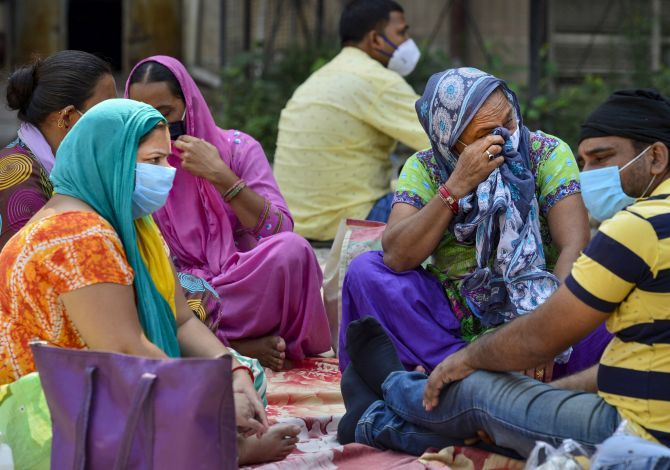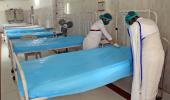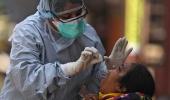With the number of COVID-19 cases set to explode in Delhi, residents are increasingly concerned about the future as horrifying tales emerge of patients running from pillar to post to secure hospital beds or even get themselves tested.

The fear of the infection almost equals the dread of navigating the complicated testing protocols and getting to the right doctor, say residents as governmental claims on hassle-free access to treatment and the number of beds clash with anecdotal reality.
However, as per the Delhi government, nearly 70 per cent of beds in five designated state-run hospitals are lying vacant.
Experts attributed the complaints of non-availability of beds or denial of treatment to COVID-19 patients to people's aversion towards state-run facilities.
As per the latest information shared on the Delhi Corona app on Thursday afternoon, more than 3,000 beds are lying vacant in the five dedicated COVID-19 hospitals that have a total capacity of 4,344 beds.
However, almost all beds at several big private hospitals are shown to be occupied.
Families of many COVID-19 patients, confirmed or suspected, have alleged in the past few weeks that they have been denied admission at many facilities or have not been able to get a bed for their kin.
Medical and public health experts feel it may be because of the image associated with government hospitals, related to infrastructure and hygiene conditions, and perhaps shortage of staff.
On Wednesday, Chief Minister Arvind Kejriwal projected that the city would require 1.5 lakh beds.
A day earlier, his deputy Manish Sisodia said the total number of coronavirus cases could rise to 5.5 lakh by July end, a quantum jump from the 32,810 cases as of Thursday.
Though the government claims there are more beds than needed, the national capital's COVID-19 reality, retold through social and other media, is also about the anguish of sons, daughters, wives and others trying desperately to get medical help for their unwell family members.
'He is no more. The govt failed us.'
That was the brief, almost staccato message on Twitter from social activist Amarpreet Kaur who took to the microblogging site to first seek help to get her father admitted and then to announce his death.
Her father tested positive for COVID-19 on June 1, but was advised home isolation.
When his condition started deteriorating, the family took him to the LNJP hospital -- Delhi government's designated COVID-19 hospital.
But the doctors, the family alleged, were unhelpful and asked them to go to Ganga Ram hospital instead.
'My dad is having high fever. We need to shift him to hospital. I am standing outside LNJP Delhi & they are not taking him in. He is having corona, high fever and breathing problem. He won't survive without help. Pls help,' Kaur tweeted.
An hour later, he was dead outside the hospital.
LNJP authorities denied her charge.
That was not the end of her story. The family needed to get tested.
And she again had to go on Twitter to ensure it happens.
Aman Pathak was luckier. He also did the round of hospitals in an effort to get his father admitted to a hospital and finally managed to do so.
The father is at the intensive care unit of the LNJP hospital.
Recounting his struggles, Pathak said his 51-year-old father developed high fever on May 24 but it subsided after a few days.
"However, my father lost his appetite. We thought he had mild symptoms so we took care of him at home. But from June 3, he started developing breathing issues. I took him to several hospitals, both private and government, but most of them turned us away," the 24-year-old software engineer told PTI.
On June 4, he even tried to get his father tested at the Delhi-government run Ambedkar Hospital, but failed to do so immediately. He tested positive the following day but now, of course, needed a hospital.
That's when the rounds began. He went from one hospital to another to be told that there were no beds.
Pathak tried to reason that the app developed by the Delhi government showed otherwise but to no avail.
"My father could not even walk, but I took him to hospitals in that condition, only to be turned away," he said.
He also sent out desperate tweets seeking help. Finally, on June 6, he managed to get his father admitted at the Ambedkar Hospital. From there, he was moved to the LNJP.
His fingers crossed, Pathak is hoping his father returns home soon.
Five days after his father developed fever, another Delhi man started shows signs of the novel coronavirus on May 29. Nine days later, he died in Bhopal without ever going to a hospital or getting any treatment.
He first went to a local health care centre and told to go home after taking paracetamol.
He also went to the GTB Hospital for a test but was reportedly.
Over the next week, the man went to five hospitals only to be turned away by each one of them. With no option left, his teen son in Bhopal asked him to travel to the city.
And so, with a fever of 103-degrees F, the man even took a train to the Madhya Pradesh capital, his high fever going undetected both at the Delhi and Bhopal railway stations.
On June 7, he died.
Back in Delhi, his 15-year-old daughter also tested positive for COVID-19 while his wife got an asthma attack due to the shock.
"When the time to test these (medical) facilities came, a promising person, who wandered in Delhi for five days but did not get treatment, died," Madhya Pradesh Health Minister Narottam Mishra told reporters after the man's death, hitting out at claims about Delhi's health infrastructure.
The stories continue in a seemingly endless loop.
Whether well-heeled and connected or poor and with no resources, the stories found resonance everywhere. Of frustrating struggles to get tested and then treated.
Several people complained that the Delhi government has launched an app to give information on availability of beds and ventilators but the reality is different. Many a time, even the helpline goes unanswered.
On June 3, 42-year-old Narender Jain died of COVID-19.
His family ran from one hospital to another in east Delhi.
Jain, who suffered from diabetes, developed fever in the last week of May.
When his situation deteriorated, the family looked for a hospital.
On June 1, the two hospitals they first approached did not have the facility to test coronavirus patients.
They moved to a private hospital which had the facility to conduct a coronavirus test but not a bed for COVID-19 patients.
His brother-in-law Vikas Jain told journalists that he was moved to a super speciality hospital which had beds but no ventilator.
Finally, he was moved to the GTB Hospital which did have a ventilator.
But it was too late.
Congress leader Rahul Gandhi this week shared a video of journalist Ajay Jha seeking help for treatment.
Jha's entire family -- wife, two daughters aged nine and five, and in-laws -- tested positive. He said his in-laws had died within 10 days.
The Delhi government is saying that everything is in control but people have been left to god's will, he said.
According to an official of the Delhi government, they contacted Jha and the family is now being given proper care.
These accounts could well be the tip of the proverbial iceberg as Delhi battles the pandemic. Not everyone has the wherewithal and means to access social media.
However, according to the latest data available on Delhi Corona app on Thursday afternoon, a total of 9,444 beds are available in private facilities and hospitals run by the central and Delhi governments. Out of these, 4,371 are vacant.
The app shows that beds are available at Delhi government-run hospitals dedicated for COVID-19 treatment such as LNJP Hospital (1,219), GTB Hospital (1,314), Rajiv Gandhi Super Speciality Hospital or RGSSH (242).
However, almost all beds at several big private hospitals are shown to be occupied.
At LNJP Hospital, there are a total of 2,000 beds, out of these 781 are occupied. GTB Hospital has total 1,500 beds, only 186 of which are occupied. Even at RGSSH, 258 of the 500 beds are occupied.
Beds are available at other dedicated COVID-19 facilities in the national capital too, according to the app. Deep Chand Bandhu Hospital has 94 unoccupied beds out of a total 176 and Satyawadi Raja Harishchandra Hospital has 145 vacant beds out of a total 168.
This makes a total of 4,344 COVID-19 beds at these five dedicated Delhi government hospitals, out of which 3,014 or 69.38 per cent are vacant.
A senior doctor at the RGSSH said, "We are only admitting very serious COVID-19 patients in the hospital. Those with mild symptoms, or asymptomatic ones, are either being home quarantined or being sent to COVID Care Centres. Our beds are on stand-by also to accommodate serious patients in case there is a sudden rush."
Delhi Heath Minster Satyendar Jain had recently said that some private hospitals could have been denying admission, but the Delhi government-run hospitals have not denied beds to any needy COVID-19 patient.
He had also said that main private hospitals are almost full to their capacity in terms of number of COVID-19 beds.
According to the app, at prominent private hospitals like Indraprastha Apollo, Max Hospital in Shalimar Bagh, Fortis Hospital in Shalimar Bagh, BL Kapur Hospital are fully occupied.
Max Hospital in Saket has a total of 200 beds for COVID-19 patients, and only one is vacant.
On June 9, the Delhi government had directed 22 private hospitals in the national capital to dedicate a total of 2,015 extra beds for treatment of coronavirus patients, revising its earlier allocation limit of 20 per cent.
Lawyer and public heath activist Ashok Agarwal said infrastructure and hygiene are two main factors, and people still want to 'avoid government facilities'.
"I know of cases, where people were willing to be on waiting list of private hospitals but did not go to a government hospital, even though beds were available," he said.
Even those who went to a government hospital for COVID-19 treatment, complained of 'dirty toilets, and these being used by multiple patients', Agarwal said.
"Also, as the cases erupted successively over the months, many people got scared and were in two minds to go to a government hospital, as admitted patients were making allegations in videos and on social media about lack of proper services.
"Besides, there is shortage of medical staff at various facilities, and each patient needs to be attended to," he argued.
Delhi government hospitals and private facilities were directed to prominently display information about the availability of beds on a flex board at their main gates.
Delhi Lt Governor Anil Baijal on Wednesday ordered Delhi hospitals to display the availability of COVID and non-COVID beds, charges for rooms or beds along with contact details on a LED board outside the hospital.
Max Hospital sources said they were already displaying the status of beds on LED screens near their reception area even before the government order.
A spokesperson from Fortis Hospital said, "We are in the process of arranging to put up the displays as per the prescribed format."
On May 30, Kejriwal said his government is 'several steps ahead' of the novel coronavirus.
There are a total of 6,600 beds and 4,500 of them are still unoccupied, he had said, adding that by June the capacity will be ramped up to 9,500 beds.
However, the reality, as Aman Pathak, Amarpreet Kaur, the teen in Bhopal and his sister in Delhi, and Narendra Jain's family will testify, is quite different.











 © 2025
© 2025